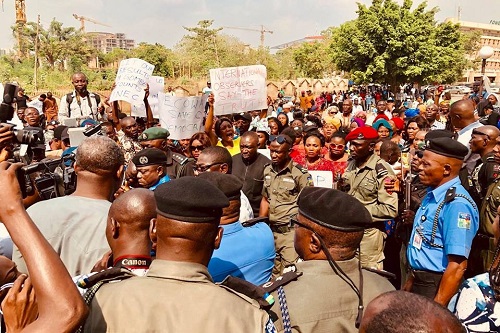FB photo
By
Jerome-Mario Utomi
When Robert Goffee and Gareth Jones- both Professors at the London Business School in their report titled; Why must anyone be led by you?, advised leaders to always reveal their weaknesses(s) to their followers, they neither had the Independent National Electoral Commission (INEC), nor the just concluded 2019 Nigerian general elections in mind.
Yet, the consequence of INEC’s inability to apply this time-honoured rule in reporting the just concluded general election has become the most popular explanation for the reactions that trailed the preliminary reports by foreign observers.
Essentially, the duo (Robert Goffee and Gareth Jones), acutely conscious of, and sharply sensitive to the advantages associated with such recommendation, explained that when leaders reveal their weaknesses, they show us who they are warts and all, establish trust that helps get folks on board, creates collaborative atmosphere, builds solidarity among followers and offers valuable protection to the leaders presenting them as approachable, humble and humane.
Human nature being what it is, if a leader fails to show some weakness, observers may invent one for them, the report concluded.
Alhough I sympathize with the awkward position INEC operated from throughout the electoral period, that notwithstanding, as someone who actively observed the 2019 electoral exercise, I hastily concluded that with the barefaced difficulties recorded at the polls, the commission will abide by the above wise counsel.
But as Nigerians and of course the international community spend most of their time and energy worrying about the lopsided impact of the just concluded election on our evolving democracy, the commission against all known logic announced to the watching world that by ‘their reckoning, coupled with various reports released by local and international observers so far, the 2019 general elections were a success, “by no means perfect” as there can be “no country in the world where general elections are perfect from the beginning to the end.”
What an arresting paradox!
However, as these contradictions cry for resolution, the most difficult but no less important task is to ascertain what these so called observers’ preliminary reports say about the election.
First is the cold fact from John Campbell, a former United States Ambassador to Nigeria, where he pointed out that; “When Nigeria transitioned from military to civilian rule in 1999, the effects on West Africa were palpable: coups lost their legitimacy, and the region has pursued a positive democratic trajectory ever since. But the latest presidential election is far from an example for those African countries consolidating their democracies or emerging from quasi-authoritarian regimes to emulate.’’
Before the dust raised by John Campbell’s comment could settle that of the American Government has gone stating- ‘As noted by many observer groups in their preliminary reports, we too were disappointed by the low voter turnout as well as credible reports of voter intimidation, vote buying, and interference by security forces, and violence in some locations. We are saddened by those acts of violence and extend our deepest sympathy to the families of those who lost their lives, including those who worked for the Independent National Electoral Commission (INEC) and the security services.’
As if that was not enough evidence for the nation that all may actually not be well with our just concluded election, the European Union Observation Mission led by the EU chief Observer, Maria Arena in their preliminary report complained that INEC had many operational shortcomings and particularly lamented the killing of almost 35 people on the election day as well as the late arrival of election materials at the polling units.’’
What the above indicates is that INEC’s argument is greeted with a number of embarrassing facts from the observers’ reports.
Among other important facts, providing answers to the following will in my view be gratifying; what parameter INEC used to adjudge an electoral process where over 35 people lost their lives as a success? What does the watching world think about INEC in the face of opposing reports from the foreign observers? And how can these groups perceive our integrity as a nation when we speak in the near future?
From the analysis of the feeble attempts made by INEC to feed Nigerians with what they considered necessary coupled with the hot vibes about foreign observers report, one thing seems to stand out.
Aside from the commission’s inability to realise that the best way to manage information is not by hoarding, I must frankly acknowledge that INEC may not be alone in this act of using more sophisticated techniques; propaganda, psychology, electronic mass media to feed Nigerians with what they choose ahead of logic and asymmetrically considered palatable for the masses.
But in taking such action, one point the government and its agencies fail to remember is that it was similar actions in the past that made the masses for the moment lose fears of punishment and yielded obedience to the power of the internet which has become their new friend while breeding the proliferation of fake news, falsehood, and propaganda as a consequence.
For us to be taken seriously by the world as a nation desirous in deepening her democracy, we must as advised by these observers encourage all stakeholders, including INEC, political parties, and the security services, to continue to improve the electoral process for future elections.
While I remind INEC of the need to remember the above, I must also admit that the ultimate solution to our electoral challenges lie in the willingness of our government to fashion and sign into law before 2023 general elections a brand new electoral act that will give full legal backing to the use of card-readers/ electronic voting system.
And I must not conclude without saying that the time to stop the use of the military for whatever electoral role is long overdue.
Jerome-Mario Utomi
Jerome-Mario is a Social Entrepreneur and an alumnus, School of media and communication, Pan Atlantic University, Lagos, Nigeria.



No Comments Yet!
You can be first to comment this post!